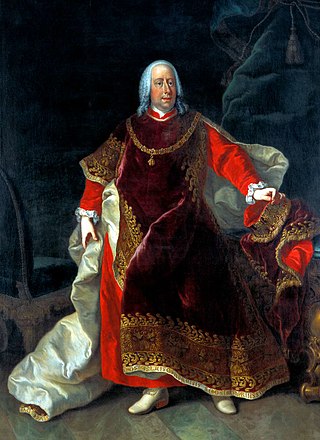Top Qs
Timeline
Chat
Perspective
Karl Anselm, 4th Prince of Thurn and Taxis
Prince of Thurn and Taxis From Wikipedia, the free encyclopedia
Remove ads
Karl Anselm, 4th Prince of Thurn and Taxis,[citation needed] full German name: Karl Anselm Fürst von Thurn und Taxis[citation needed] (2 June 1733 – 13 November 1805)[citation needed] was the fourth Prince of Thurn and Taxis, Postmaster General of the Imperial Reichspost, and Head of the Princely House of Thurn and Taxis from 17 March 1773 until his death on 13 November 1805.[citation needed] Karl Anselm served as Prinzipalkommissar at the Perpetual Imperial Diet in Regensburg for Joseph II, Holy Roman Emperor and Francis II, Holy Roman Emperor from 1773 to 1797.
You can help expand this article with text translated from the corresponding article in German. (November 2009) Click [show] for important translation instructions.
|

Remove ads
Early life
Karl Anselm was the eldest son of Alexander Ferdinand, 3rd Prince of Thurn and Taxis and Margravine Sophie Christine of Brandenburg-Bayreuth.[citation needed]
Marriages and family
Summarize
Perspective
Karl Anselm married Duchess Auguste of Württemberg, sixth and youngest child of Karl Alexander, Duke of Württemberg and his wife Princess Maria Augusta of Thurn and Taxis, on 3 September 1753 in Stuttgart, Duchy of Württemberg.[citation needed] Karl Anselm and Auguste had eight children:[citation needed]
- Princess Maria Theresia of Thurn and Taxis (born 10 July 1757 † 9 March 1776)[citation needed]
- ∞ 25 August 1774 Kraft Ernst, Prince of Oettingen-Oettingen
- Princess Sophie Friederike of Thurn and Taxis (born 20 July 1758; † 31 May 1800)[citation needed]
- ∞ 31 December 1775 Prince Hieronim Wincenty Radziwiłł (11 May 1759-18 September 1786)
- ∞ around 1795 NN Kazanowski
- ∞ 1797 to a Count Ostrorog
- Prince Franz Johann Nepomuck of Thurn and Taxis (baptized 2 October 1759; † 22 January 1760)[citation needed]
- Princess Henrica Karoline of Thurn and Taxis (baptized 25 April 1762; † 25 April 1784)[citation needed]
- ∞ 21 April 1783 with Johannes Aloysius II, Prince of Oettingen-Oettingen and Oettingen-Spielberg
- Prince Alexander Karl of Thurn and Taxis (born 19 April 1763; † 21 April 1763)[citation needed]
- Princess Friederike Dorothea of Thurn and Taxis (born 11 September 1764 † 10 November 1764)[citation needed]
- Karl Alexander, 5th Prince of Thurn and Taxis (born 22 February 1770; † 15 July 1827)[citation needed]
- ∞ 25 May 1789 with Duchess Therese of Mecklenburg-Strelitz
- Prince Friedrich Johann Nepomuck of Thurn and Taxis (born 11 April 1772 † 7 December 1805), unmarried[citation needed]
Auguste and Karl Anselm had eight children until 1772.[citation needed] After several assassination attempts by his wife, Karl Anselm banished Auguste in January 1776 to strict house arrest at first to Burg Trugenhofen (later renamed Schloss Taxis) in Dischingen and then to Schloss Hornberg in the Black Forest, where she died on 4 June 1787. The couple legally divorced in 1776.[citation needed] Following the death of his first wife, Karl Anselm married that same year morganatically to Elisabeth Hildebrand.[1]
Remove ads
Acquisition of new territories
Karl Anselm acquired in 1786, the Swabian county of Friedberg-Scheer and had to spend almost the entire proceeds from the Imperial Reichspost. Thereupon the Emperor Joseph II brought the county to "Gefürsteten Grafschaft" status. During the invasion of French troops in the Austrian Netherlands in 1794, the local properties of the Thurn und Taxis family were seized. With the further advance of the French troops, all the possessions of the Thurn and Taxis were lost. To compensate, Karl Anselm was awarded in 1803, according to Article 13 of the Reichsdeputationshauptschluss (formally the Hauptschluss der außerordentlichen Reichsdeputation, or "Principal Conclusion of the Extraordinary Imperial Delegation") other Swabian lands, including the Free Imperial City of Buchau, the Imperial Abbey of Buchau, the Imperial Abbeys of Marchtal and Neresheim, Ostrach, and other villages.
Losses within the Reichspost
By 1790, the hereditary fiefs of the Thurn and Taxis family fueled the Imperial Reichspost to its greatest extent. The Austrian Netherlands and Tyrol were added to the Thurn and Taxis postal system. Due to the Napoleonic Wars, Karl Anselm's Imperial Reichspost gradually lost more and more postal districts beginning with the Austrian Netherlands, thus depriving the post of important sources of revenue. With the Treaty of Lunéville formalized on 9 February 1801, the Imperial Reichspost lost all postal districts in the Rhine region. After Prussia had been compensated for the loss of its left-bank territories by right bank areas in May 1802, Prussia took over the sovereignty over the postal services, and so the Imperial Reichspost lost further postal districts. Only under his son and successor, Karl Alexander, was the Thurn and Taxis family able to re-establish its postal system as the private company Thurn-und-Taxis-Post.
Remove ads
Ancestry
Remove ads
References
Sources
Wikiwand - on
Seamless Wikipedia browsing. On steroids.
Remove ads

